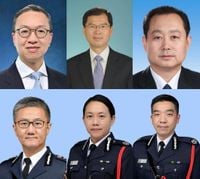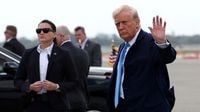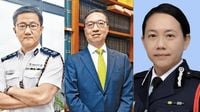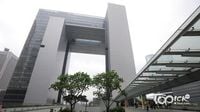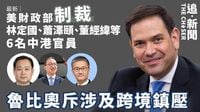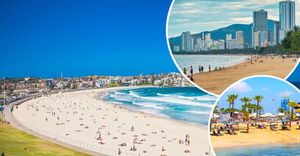On March 31, 2025, the U.S. government announced sanctions against six Hong Kong and mainland Chinese officials, a significant move that underscores ongoing tensions between the United States and China regarding human rights and governance practices in Hong Kong. The sanctioned individuals include Secretary for Justice Lam Ting-kwok, Commissioner of Police Siu Chak-yee, Secretary-General of the National Security Committee Au Chi-kwong, Director of the Hong Kong National Security Office Dong Jingwei, and two Assistant Commissioners of Police, Wong Chung-chun and Chiu Wing-lan.
U.S. Senator Marco Rubio, in a statement regarding the sanctions, emphasized that these officials have been implicated in policies that undermine Hong Kong's autonomy and have engaged in transnational repression against individuals residing in the United States. Specifically, the sanctions target those involved in the implementation of the controversial Hong Kong National Security Law, which has been criticized for stifling dissent and curtailing freedoms in the region.
This latest round of sanctions marks the first time in four years that Hong Kong officials have faced U.S. penalties. The State Department's announcement indicated that these actions were taken in response to the officials' roles in using the National Security Law to intimidate and harass 19 pro-democracy figures who have fled abroad, including one U.S. citizen and four U.S. residents. The U.S. government has cited these actions as a direct violation of China's commitments under the Sino-British Joint Declaration, which guarantees a high degree of autonomy for Hong Kong.
The sanctions were officially managed by the Office of Foreign Assets Control (OFAC), which is responsible for enforcing U.S. economic and trade sanctions. Individuals placed on the Specially Designated Nationals (SDN) list face severe restrictions: all their assets within the U.S. are frozen, and U.S. citizens are prohibited from conducting any transactions with them unless specifically authorized. This includes not only financial transactions but also providing any form of support or services.
In response to the sanctions, the Hong Kong government issued a strong condemnation at 2:02 AM on April 1, 2025. The statement characterized the U.S. actions as a manifestation of "American hegemonism" and a blatant interference in Hong Kong's internal affairs. The government spokesperson asserted that the sanctioned officials "scoff at the so-called sanctions" and reaffirmed their commitment to safeguarding national security.
The spokesperson further clarified that the individuals targeted by the U.S. sanctions are fugitives wanted for activities that threaten national security, not for exercising their freedom of expression. This includes activities like inciting secession and soliciting foreign intervention against the Chinese government and Hong Kong authorities. The Hong Kong government emphasized its legal obligation to pursue those suspected of endangering national security, regardless of their political affiliations or backgrounds.
The sanctions against these officials come amid a backdrop of increasing scrutiny over China's handling of dissent in Hong Kong. The U.S. has previously imposed sanctions on multiple Hong Kong and Chinese officials since the enactment of the National Security Law in 2020, which has been described as a tool for the Beijing government to exert control over the territory.
Notably, this is not the first time that U.S. sanctions have impacted the personal lives of Hong Kong officials. In August 2020, former Chief Executive Carrie Lam expressed that she could no longer access banking services due to similar sanctions, highlighting the significant personal and professional consequences that such measures can impose.
The U.S. sanctions are part of a broader strategy to hold accountable those perceived to be undermining democracy and human rights in Hong Kong. The recent actions have garnered varied responses, with pro-democracy advocates welcoming the sanctions as a necessary step in the fight for freedom, while Chinese officials have denounced them as unjust interference.
As tensions continue to rise, the Hong Kong government remains steadfast in its position, asserting that it will take all necessary legal measures to combat actions that threaten national security. The implications of these sanctions extend beyond the individuals directly affected; they signal a continuing confrontation between the U.S. and China regarding the future of Hong Kong and its governance.
In summary, the latest U.S. sanctions against Hong Kong officials reflect ongoing geopolitical tensions and raise questions about the future of autonomy in the region. As both sides prepare for potential escalation, the international community watches closely, aware that the situation in Hong Kong could have far-reaching consequences.
